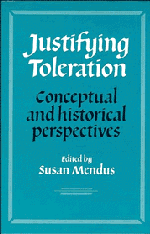Book contents
- Frontmatter
- Contents
- Preface
- Introduction
- 1 Scepticism and toleration in the seventeenth century
- 2 A more tolerant Hobbes?
- 3 Locke: toleration and the rationality of persecution
- 4 Toleration and Mill's liberty of thought and discussion
- 5 Rousseau and respect for others
- 6 The intolerable
- 7 Autonomy, toleration, and the harm principle
- 8 Friendship, truth, and politics: Hannah Arendt and toleration
- 9 Dissent, toleration, and civil rights in communism
- 10 Liberalism, marxism, and tolerance
- 11 Socialism and toleration
- Index
9 - Dissent, toleration, and civil rights in communism
Published online by Cambridge University Press: 20 May 2010
- Frontmatter
- Contents
- Preface
- Introduction
- 1 Scepticism and toleration in the seventeenth century
- 2 A more tolerant Hobbes?
- 3 Locke: toleration and the rationality of persecution
- 4 Toleration and Mill's liberty of thought and discussion
- 5 Rousseau and respect for others
- 6 The intolerable
- 7 Autonomy, toleration, and the harm principle
- 8 Friendship, truth, and politics: Hannah Arendt and toleration
- 9 Dissent, toleration, and civil rights in communism
- 10 Liberalism, marxism, and tolerance
- 11 Socialism and toleration
- Index
Summary
I take it that the typical liberal view of dissent is roughly that the individual citizen has a right to oppose the laws or policies of his state, and that he has a right to express his opposition by attempting to persuade others to share his views, but that he has no right to disobey any constitutionally valid law to which he might happen to object. Nor has he any right to disobey such laws, even if he doesn't happen to object to them, as a way of making a public point or protest against some other aspect of the law or of governmental policy. The position is even more restrictive in that the right to dissent is strictly derivative in the sense that it exists only as embodied in a number of crucial individual or civil rights – freedom of speech, of assembly, of association, and the right to the suffrage. Indeed, the right to vote represents the most vital avenue through which opinion may be translated into actual legal or political reform. Taken together, then, this constellation of rights secures to the individual the right to engage in effective dissent, but no further right to disobedience.
Even so, the liberal more often than not tends to look upon acts of civil disobedience in a markedly lenient manner, in particular by insisting upon distinguishing them from criminal acts and by mitigating the usual sanctions applied to law-breakers.
- Type
- Chapter
- Information
- Justifying TolerationConceptual and Historical Perspectives, pp. 199 - 222Publisher: Cambridge University PressPrint publication year: 1988



